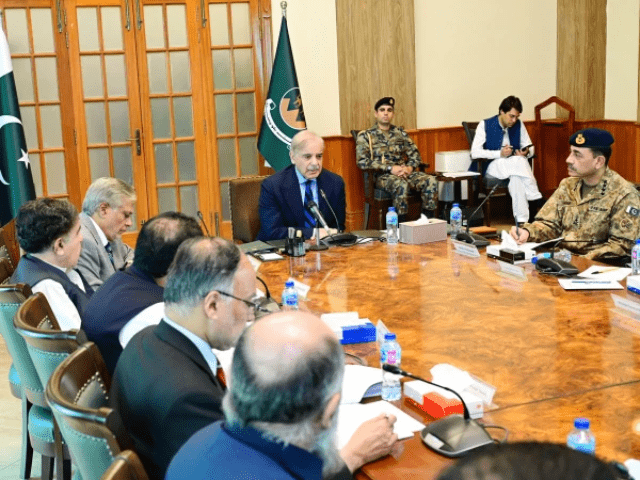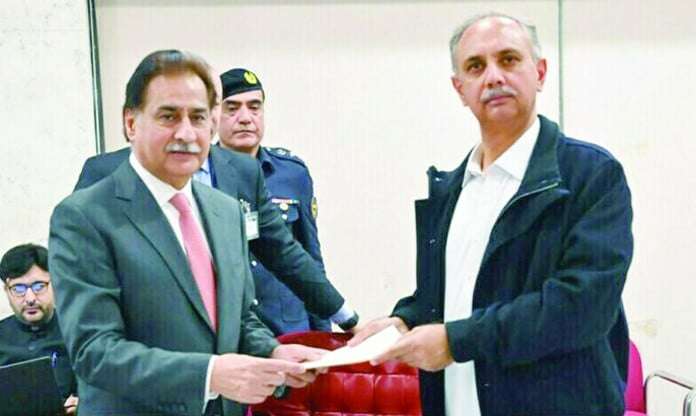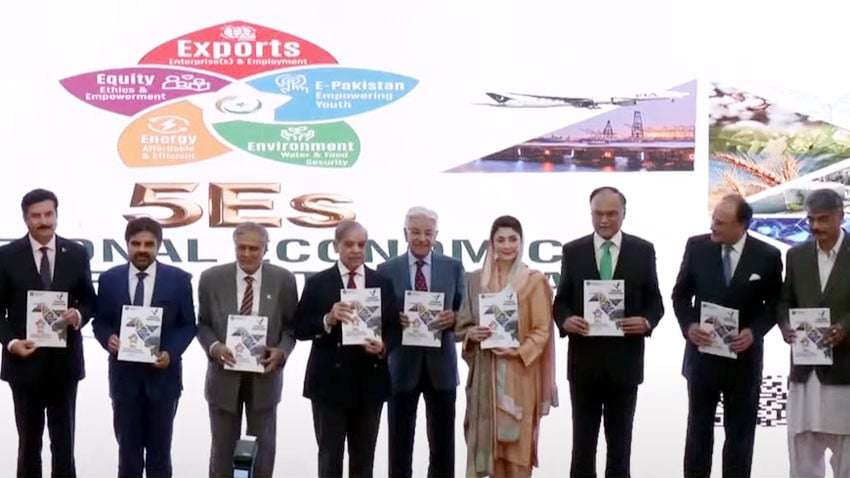Introduction
Prime Minister Shehbaz Sharif has strongly emphasized the need to eliminate conspirators and their facilitators who are plotting against Pakistan. In a recent meeting of the National Action Plan (NAP) Apex Committee, the Prime Minister discussed the country’s security challenges, the growing digital threats, and the importance of maintaining peace for the nation’s prosperity.
Prime Minister’s Address to NAP Apex Committee
In his address, Prime Minister Shehbaz Sharif underlined the critical need to confront and eliminate anti-state elements threatening the stability of the country. The meeting, which included key federal ministers, Chief Ministers, security officials, and representatives from Pakistan’s intelligence agencies, was an opportunity for the Prime Minister to outline his vision for Pakistan’s security and diplomatic engagements.
The Prime Minister’s remarks also underscored the importance of addressing both internal and external threats. These challenges include extremist factions, foreign-backed insurgents, and the misuse of digital platforms for spreading misinformation and destabilizing the state.
Key Issues Discussed
- National Security Challenges Prime Minister Sharif highlighted the security threats Pakistan faces, particularly from hostile elements operating along its borders. He mentioned a recent border attack that was swiftly repelled by Pakistan’s armed forces, emphasizing the country’s resilience in the face of external aggression.
- Role in Global Diplomacy He also noted Pakistan’s recent election as a non-permanent member of the United Nations Security Council (UNSC). This, he said, would allow Pakistan to play a more influential role in international diplomacy, further elevating its position on the global stage.
- Extremism and Sectarian Violence The Prime Minister acknowledged the ongoing issues of terrorism and sectarian violence. He made it clear that eradicating extremism was paramount for Pakistan’s future, emphasizing the role of peace and stability in the nation’s long-term progress.
Focus on Provincial and Federal Coordination
Shehbaz Sharif emphasized that the nation’s progress depends on ensuring peace and order not just at the federal level but across all provinces, including Gilgit-Baltistan and Azad Jammu and Kashmir. He called for a united and coordinated approach between the provinces, the federal government, and defense institutions to safeguard Pakistan’s sovereignty and prosperity.
Addressing Digital Media Challenges
The Prime Minister devoted considerable attention to the growing challenge posed by digital media. He identified the misuse of social media as a significant issue that needs to be addressed to prevent the spread of fake news and harmful narratives. This, he said, was a vital aspect of Pakistan’s efforts to combat terrorism and extremism.
Misinformation Campaigns
Prime Minister Sharif pointed out that external elements were increasingly using social media platforms to spread venomous content against Pakistan. These campaigns, fueled by distorted facts and manipulated narratives, not only misrepresented the country’s situation but also undermined its image globally.
He warned that failure to address this challenge would render all efforts to combat terrorism and extremism futile. The Prime Minister specifically cited the misinformation campaign surrounding the martyrdom of Rangers personnel in November 2023 as an example of how fake news could harm national security efforts.
Operation Azm-e-Istehkam: A Comprehensive Strategy
What is Operation Azm-e-Istehkam?
Operation Azm-e-Istehkam is a strategic operation aimed at eradicating terrorism and extremism across Pakistan. It represents a comprehensive effort to address the threats posed by extremist elements, with an emphasis on coordination between the federal and provincial governments, as well as law enforcement agencies. The operation is designed to align efforts across multiple fronts, including:
- Strengthening Security Forces: Operation Azm-e-Istehkam will bolster the efforts of Pakistan’s armed forces, law enforcement, and intelligence agencies to eliminate terrorism in the country.
- Legislative Reforms: The operation will push for effective legislative changes to close the legal loopholes that currently hinder the prosecution of terrorism-related cases. These reforms will ensure swift and exemplary punishment for those found guilty of extremist activities.
- Socio-Economic Measures: In addition to military and legislative efforts, the operation will also focus on addressing the root causes of extremism. Socio-economic measures will be taken to improve the standard of living, reduce inequalities, and prevent the spread of extremist ideologies.
- National Unity: The operation will emphasize national unity, ensuring that all factions, institutions, and citizens are aligned in the fight against terrorism. No one will be allowed to challenge the state’s authority without consequences.
Security of Chinese Nationals
The meeting also discussed measures to ensure the safety of Chinese nationals in Pakistan. Following the Prime Minister’s directives, new Standard Operating Procedures (SOPs) were introduced to enhance the security framework for Chinese citizens, particularly in areas where they are involved in infrastructure projects as part of the China-Pakistan Economic Corridor (CPEC).
The Importance of Unity and Collective Action
Prime Minister Shehbaz Sharif reiterated the importance of unity in overcoming the challenges faced by Pakistan. He urged all citizens, political parties, and security forces to work together for the nation’s progress. By confronting terrorism, extremism, and misinformation, Pakistan could ensure its future stability and prosperity.
The Prime Minister expressed his unwavering confidence in Pakistan’s ability to tackle these challenges, with the support of the international community and a united approach from within.
Conclusion
Prime Minister Shehbaz Sharif’s address to the NAP Apex Committee signals Pakistan’s commitment to tackling its security challenges head-on. From combating terrorism and extremism to confronting digital media threats, the government is actively working on comprehensive solutions to ensure the nation’s stability and progress. The Prime Minister’s call for unity and coordinated action across all institutions, both at the federal and provincial levels, will be crucial for Pakistan’s long-term prosperity.
FAQs
1. What is Operation Azm-e-Istehkam? Operation Azm-e-Istehkam is a national initiative aimed at eradicating terrorism and extremism through coordinated efforts among Pakistan’s security forces, law enforcement agencies, and legislative reforms.
2. How will the government counter digital media challenges? The government plans to tackle misinformation on social media by monitoring and countering harmful narratives. Measures will include stricter regulations and public awareness campaigns to protect Pakistan’s image.
3. Why is Pakistan’s role in the United Nations Security Council important? Pakistan’s position as a non-permanent member of the UNSC allows it to influence global diplomacy, advocate for national interests, and contribute to international peace and security.
4. What steps are being taken to ensure the security of Chinese nationals in Pakistan? The government has introduced new Standard Operating Procedures (SOPs) to enhance the safety and security of Chinese citizens in Pakistan, particularly those involved in CPEC projects.
5. What does the Prime Minister mean by national unity in combating extremism? National unity refers to the collective effort of all institutions, political parties, and citizens working together to address the challenges posed by terrorism, extremism, and external threats.



